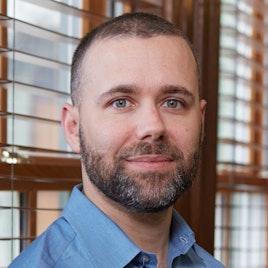For Funders, a Responsible Exit Is an Elusive Ideal
By Jonathan Cohen
On a visit with grantees in Romania last month, I found myself thinking a lot about exits. Maybe it was the effect of visiting a country where the Open Society Foundations used to have a thriving office but now has fewer programs, most of them operated from abroad.
In philanthropy, we talk a lot about “exiting responsibly,” leaving our grantees strong enough to continue without our funding—but is this realistic?
The achievements of the grantees I met would suggest that perhaps it is. In two separate homes, my colleagues and I were greeted with tea and cake by people with intellectual disabilities who were once warehoused in communist-era institutions. Now living with supportive services in their community, they showed us photographs of their trips to the beach, played with their selfie sticks, and shared stories and worries about their new jobs.
Our grantee organization running the housing service and providing support, Pro ACT, receives a reimbursement from the Romanian government for every client they serve. For its part, the government has ratified the Convention on the Rights of Persons with Disabilities and adopted a strategy that explicitly commits to deinstitutionalization. So, when it comes to disability rights in Romania, is it time for Open Society to exit?
Not so fast.
Meeting with Pro ACT, I found that they still needed support for work that their government doesn’t provide: flexible funding to advocate for disability rights, advice from peers in other countries that have undertaken large-scale deinstitutionalization, and funds to pilot innovative services for people with the highest support needs. Another organization of disability advocates, Ceva de Spus, relies on private foundations to support campaigns and advocacy targeting the silence and stigma attached to disability in Romania.
In the field of harm reduction, by contrast, the Open Society Foundations did exit Romania. After piloting needle and syringe programs for many years, it seemed as if the Global Fund to Fight AIDS, Tuberculosis, and Malaria—then a newly established public–private partnership to tackle global public health needs—would sustain these services into the future. But after doing so for five years, the Global Fund stopped funding them in 2010.
This was part of the Global Fund’s exit from upper-middle-income countries, which many of its donors felt were wealthy enough to pay for programs on their own. But while the Romanian government is willing to pay for some AIDS services, it largely neglects those, such as harm reduction, that stir public controversy by channeling funds to nongovernmental organizations and unpopular populations.
So now, the Open Society Foundations find itself re-engaging for harm reduction in Romania, as part of work in multiple countries to urge the Global Fund to plan sustainable transitions that guarantee basic levels of service coverage, at least until it is clear that governments will take them on.
Sharing these two experiences with a colleague, she reminded me that even when bigger funders such as governments or the Global Fund enter the scene, private philanthropy can make a big difference focusing on small, often invisible gaps like these in a larger story of social injustice.
Some development experts refer to the “sustainability myth”—the false notion that organizations can ever become independent of their funders. To be sure, no private funder can be expected to stay around forever, especially if it means substituting ourselves for governments who are obliged to provide services to those in need.
But funders don’t exit into utopia: we exit into the messy work of holding governments accountable to this obligation. In this, it is hard to imagine we will never have a role. Even in the most open societies, the gains don’t protect themselves.
Instead of striving to exit, perhaps we should keep our focus on evolving priorities. If and when programs are taken over by governments or large donors, it may no longer be a priority for their initial funders to support them. But then those funders’ priorities shift: depending on the environment, we may need to fund advocacy or technical assistance to protect the services we piloted. We may need to pilot the next generation of services that the government is too risk-averse to pay for.
Or, we may decide we have other priorities—but in doing so, we are making a choice. Although this is our choice to make, we should not allow the allure of exiting to obscure this truth.
As another colleague mused, perhaps exit is like enlightenment: you work toward it, but rarely achieve the state required to actually make it possible.

Until November 2021, Jonathan Cohen was the director of the Open Society Public Health Program.